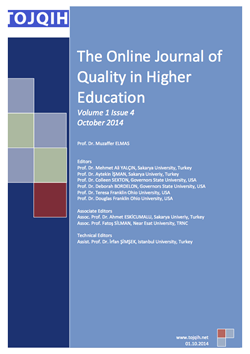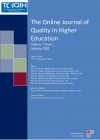TOJQIH - Volume 1 - Issue 4 - October 2014
 Outermost European Regions Of The Atlantic Area Network
Outermost European Regions Of The Atlantic Area Network Rogerio Roth
Abstract: The European Union`s structural funds are one of the few options currently available to finance technological infrastructures. This is an opportunity to be exploited by the University of the Azores. The ideal partners of UAC are the FCCN and the universities of the outermost regions of the EU, represented by UNAMUNO association. The OERAAN does not need to be real but can be a virtual network and use the third-party infrastructures. There are several reasons to submit a proposal to the FP7 and just one not to do so.
 Mentoring Program as a Predictor of Mentees’ Academic Performance in Higher Education in Malaysia
Mentoring Program as a Predictor of Mentees’ Academic Performance in Higher Education in Malaysia Fariza Md Sham
Abstract: Most Islamic muamalat literature highlight that mentoring is an important activity in counseling, education and/or tasawuf. For example, counseling is often said as al-irsyad (al-Ghazali,1969) where mentors are viewed as experts in psychology that can be offered to solve individual problems. While, in an educational context, mentors are often called as muaddib, murabbi, mursyid, mu’allim and/or mudarris (Abd.halim, 2010). In addition, in a tawasuf viewpoint, mentoring is also known as al-suluk (good moral and well behaved) where a learning groups is properly guided by an individual who has comprehensive syariah knowledge, tarekat and hakikat, namely Shaykh (mentor). The discussion clearly explains that mentoring concept has been successfully implemented in the era of prophet Muhmmad SAW and now its notion is adapted as a learning method to maintain and achieve the organizational strategy and goals. This study was conducted to examine the relationship between mentoring program and mentees’ academic performance. A survey method was employed to gather self-report questionnaires from bachelor degree students in higher learning institutions in East Malaysia. The results of SmartPLS path model revealed two important findings: firstly, communication positively and significantly correlated with academic performance. Secondly, support positively and significantly correlated with academic performance. The result demonstrates that mentoring program does act as an important predictor of mentees’ academic performance in the studied organization. In addition, discussion, implications and conclusion are elaborated.
 Organizing International Cooperation For Maritime Education And Training To Improve The Quality
Organizing International Cooperation For Maritime Education And Training To Improve The Quality Ergun Demirel
Abstract: A significant mission of the education and training is to support the industry and business in particular for providing qualified manpower. The world merchant fleet is improving both in quality and quantity to meet the shipping industry’s requirements as well as all related economic activities. The requirements of shipping industry are significantly increasing to fully support rapidly growing world economy. The growing numbers of the ships transiting throughout the waterways, and in open seas are increasing and marine pollution is becoming / (has become) a sensitive issue. Not only technical measures but also studies on human element are deemed necessary to ensure safety at sea. The world is still facing a shortage of officers in quality and quantity which may severely affect the future of shipping.The IMO, the international regulating organization has revised the standard of education and training for officers and ratings (STCW) to improve the quality of maritime education and training (MET) to meet the existing and future requirements. These new changes to STCW have accelerated international cooperation for research and development in MET, which has provided mutual support and information sharing, and led to the development of several new course and novel tools. The projects supported by the European Union, such as SOS (Safety at Sea), E-GMDSS and GMDSS VET (e-learning GMDSS), TRAIN 4Cs I and II (Mobility and Certification), MarTEL (Maritime English Standards), MarEng Plus (Maritime English content), UniMET (Consolidated MET) have proved the benefits and importance of international cooperation and produced very beneficial results for international MET providers for whom there now is a new initiative to establish a worldwide network (platform).This study gives a background to existing studies for the development of the MET programmes and practices and its role in bringing other parties for international cooperation to achieve a common goal. In the light of the impact of several MET projects, some findings for hint points for organizing international cooperation are also discussed.
 The Study Of New Methodology
The Study Of New Methodology Yeon Soo-Kim
Abstract: The methodology of the social sciences can be found in Europe in 1920, when the psychological aspects of the experimental research method was the nation, while case studies in the United States were in 1940s, when experimental study was firstly applied. After that, criticism began. Quantitative methods began to be used from the 1960s, on the other hand, qualitative research was actively visible in the 1970s in Germany. Different research methods controversy began. The studies were in the United States and Europe. You have any questions in a variety of academic backgrounds. ?? In this study, I will suggest a new methodology.
 Preparing The Future Faculty Workforce By Analyzing The Postdoctoral Experience
Preparing The Future Faculty Workforce By Analyzing The Postdoctoral Experience Maria Victoria Tejada-Simon
Abstract: To develop a curriculum for post-doctoral trainees and to determine the requirements and needs for such a program, a needs assessment study was performed. By using a survey-questionnaire, we were able to evaluate former post-doctoral trainees’ experience and their later career outcomes. Our data shows that, across the time studied at our Institution, research science training proved to be outstanding; instruction in presentations and writing skills was reported to be low-average, while preparation in teaching, career development, and faculty dynamics was clearly insufficient. Taken all together our data indicates that in order prepare the next generation of higher education professoriate, we should seriously consider to develop a more comprehensive postdoctoral research training program in which trainees will acquire not only research skills but also teaching, writing, and other valuable expertise for improving their chances on becoming successful teachers and scientists.
 The Implementation of Malaysian Higher Education Strategic Plan for International Marketing: A Focus Study on West Asian Students
The Implementation of Malaysian Higher Education Strategic Plan for International Marketing: A Focus Study on West Asian Students Siti Rugayah Tibek[1], Wan Kamal Mujani[2], Maznah Hj. Ibrahim Kamaruzaman Yusoff[3], Fariza Sham[4], Mohad Faisal Ashari[5]
Abstract: Universiti Kebangsaan Malaysia (UKM) Strategic Plan 2006-2010 is a revised edition of the Malaysian’s National Higher Education Strategic Plan 2020. The UKM Strategic Plan is legislated as a guide to equip UKM with the realities and challenges of education in the new millennium. In the revised UKM Strategic Plan (2006-2010 Perspective), environmental analysis on local and global issues that might influence significant impacts on higher education and UKM in specific, are given special focus. In line with the strategic planning concept, specific processes which include robust revisions, and in depth analysis have been done to ensure maximum achievement and effectiveness of such strategic plan. This paper discusses the impacts achieved in the fifth thrust of UKM International Marketing Strategic Plan 2006 – 2010. Employing both quantitative and qualitative methodological approach, this paper discovers and identifies two major educational issues which are: identifying the influencing factors in higher education’s demand among West Asian students and focussing on the challenges faced by public universities and West Asian students in Malaysia. In the conclusion, we suggested various international marketing strategies to activate and boost Malaysia higher education programmes effectively and to position Malaysian educational programmes strategically at a global perspective.
 Quality Assurance For Transition Areas From Vocational To Academic Education
Quality Assurance For Transition Areas From Vocational To Academic Education Christian-Andreas Schumann[1], Claudia Dittrich[2], Eike Ickelsheimer[3]
Abstract: The cooperation between the West Saxon University of Applied Sciences Zwickau and a non-academic educational provider is a relative new form of education, within which vocational competencies get extended in a way, so that their later accreditation is easily possible. For the co-operation model with the Academy for Business and Administration existing competencies get recognized on the basis of a joint quality management and are complemented by supplemental offerings with the result, that an augmented accreditation and therefore the assessment in a higher semester is possible. Within the frame of lectures, which are implemented by both educational institutions, different preliminary competencies get adjusted in the transition area. The quality assurance concept that covers contents, teachers and organization guarantees that rendered achievements can be recognized in any case. The accreditation procedure as a whole serves as beneficial activity to facilitate the transition from vocational to academic education and to abbreviate the duration of study. But also the further development of additional offers and tutoring systems are important components of the recognition and transfer management since they benefit the formative and developmental process of vocational qualified individuals regarding quality enhancement.


